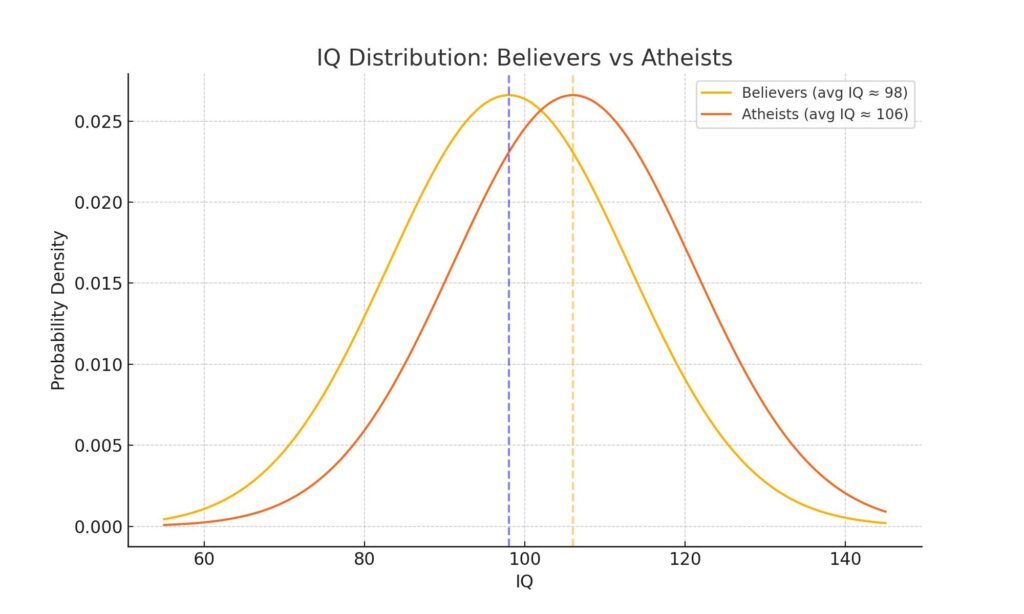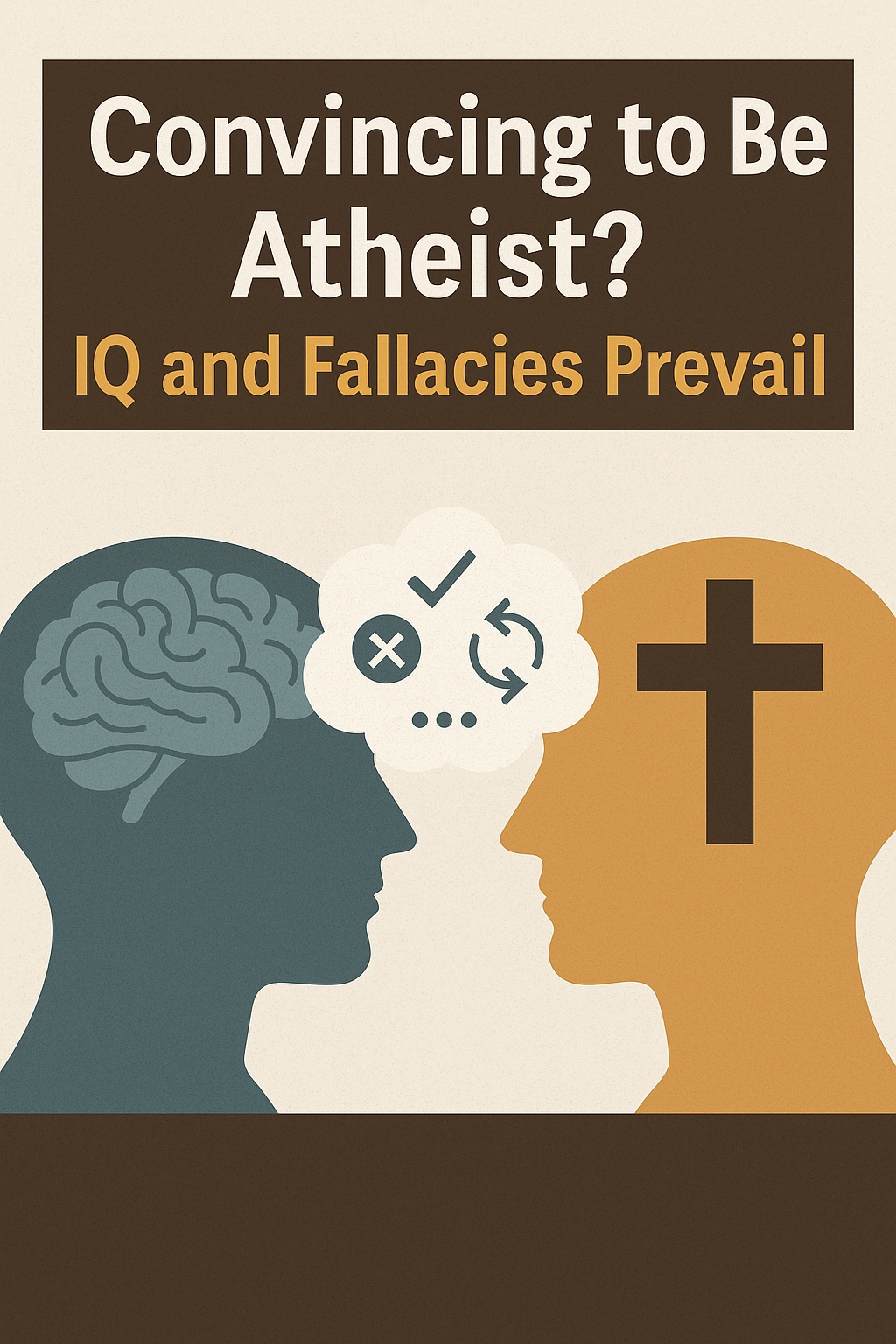People often assume that religious belief disappears once intelligence rises. They imagine that with enough education, reading, and logic, belief simply crumbles. But this illusion collapses the moment you meet a religious scholar. Or a spiritual software engineer. Or a theistic philosopher. Suddenly, it becomes obvious: intelligence does not prevent belief. In fact, it often strengthens it. Believers are not always ignorant. Some are intelligent. Some are informed. But even then, they remain trapped—because belief thrives not only in ignorance but in fallacies, identity, emotion, and cognitive instinct. And atheism is slowly leaving.
I know dozens of believers. Some never read anything outside their religious circle. Some meditate and feel “a presence.” Others say they believe because they “just know.” But some are well-read, even articulate. They study arguments. They discuss ethics. And yet, despite everything, they cling to religion. Why?
Because reason is not what decides belief. Something deeper does.
Intelligent believers: Not stupid, just illogical
Let us not confuse intelligence with rationality. The two often diverge. Intelligent people can hold absurd beliefs—especially if those beliefs come from childhood, family, or cultural comfort. Instead of using intelligence to question dogma, they use it to defend it; instead of seeing fallacies, they construct elegant justifications. Instead of examining contradictions, they reinterpret them into metaphors. The smarter the believer, the more elaborate the excuse.
They apply this tactic everywhere. When something good happens, it is divine mercy. When tragedy strikes, it is a test. If someone else suffers, it is a warning. If they suffer, it is a lesson. Evil becomes Satan. Or free will. Or mystery. Their logic bends and stretches infinitely. They bend it however it suits them.
Even their theodicy becomes elastic. They say God respects free will. But when He intervenes in one case and ignores another, they explain both as divine wisdom. No matter what happens, they always find a divine reason. That is not thinking—it is spinning.
Low IQ and religion: A cage built in the brain

Now shift the lens to people with lower intelligence. Here, the problem is even deeper. It is not that they argue poorly—it is that they cannot follow abstract reasoning at all. They lack the cognitive structure to evaluate evolutionary theory, historical analysis, or textual criticism. Fallacies are not occasional; they are default settings.
For these minds, religious belief is not a conclusion—it is the only available framework. Their mind cannot question the logic of salvation. It cannot grasp probabilistic thinking, it cannot follow the corruption of manuscripts. It cannot compare religious claims across cultures. Even basic logic becomes heavy.
Moreover, religion is not just belief. It is identity. It is heritage. And it is emotional grounding. It tells them who they are and why the world hurts. Convincing them that evolution is evidence-based or that nobody knew Jesus personally makes no dent. The idea simply floats above them, never connecting.
Fallacies in action: The brain’s built-in errors
All human minds, regardless of IQ, rely on shortcuts. These shortcuts, called cognitive biases and formal fallacies, helped early humans survive. But today, they block understanding.
For example, confirmation bias makes people seek only information that supports their belief. Agent detection tricks them into thinking every unexplained event has a will behind it. Argument from ignorance tells them that “if science does not know something, God must have done it.” Appeal to authority leads them to trust priests over physicists.
Religious systems exploit these flaws ruthlessly. The mind becomes a closed loop. Doubt feels dangerous. Certainty feels moral.
Even the false dichotomy works well: either God created the universe or it came from nothing. Either morality comes from God or nothing matters. These are false choices, but they feel real. They comfort people. They bypass logic.
Faith: Evolution wired us to believe
Humans did not evolve to understand the cosmos. They evolved to survive in tribes. And for tribal survival, belief often helped. Religion bonded groups. It explained suffering; it created rituals that reinforced cohesion. And it punished raitors. It made loyalty sacred.
As a result, evolution built into us a deep tendency to believe in agency, morality, and fate. We saw gods in storms, we saw demons in illness. We saw purpose in randomness. Our brain prefers stories, not statistics. It prefers emotion over evidence. It prefers belonging over truth.
This is why belief often survives even in the face of crushing evidence. Religion is not an intellectual mistake—it is an evolutionary adaptation. We are programmed to believe. And that programming runs deep.
Christianity is not the default: Just one option among many
Yet people act as if Christianity is the natural belief. As if the story of Jesus sits at the center of logic and history. But that is an illusion of geography. Had you been born in Mecca, you would probably be Muslim; had you been born in India, you would chant mantras. Had you been born in 300 BCE, you would worship gods with animal heads.
People believe not because they evaluate religions, but because they inherit them. Belief is an accident of birth. Yet people defend it with full confidence, as if they had chosen it rationally.
This alone should raise suspicion. But it rarely does.
Why Monotheism came so late: Billions of years of silence
This universe is 13.8 billion years old. For most of that time, there were no humans. For billions of years, life evolved in silence. Dinosaurs reigned. Species rose and vanished. Homo sapiens came late. For most of our existence, we were animists, polytheists, or ancestor worshippers.
Monotheism appeared only recently. And it appeared locally, through tribal scribes, wars, and oral tales. Why would a real God wait so long? And why would He reveal Himself in vague stories, scattered across flawed manuscripts, instead of speaking clearly to all humans?
Why would a divine being arrive so late—and so regionally?
Atheism: New Testament trouble: Edited, contradicted, and corrupted
Even if we accept that Jesus existed, the New Testament provides no reliable record. It was written decades after his death, by anonymous authors, in a language he never spoke. The gospels contradict each other on key facts—lineage, location, last words. Whole stories—like the adulteress forgiven by Jesus—appear only in later manuscripts.
Worse, the text has been corrupted over time. Entire verses were added. Words were changed. Theology was shaped by translators, not prophets. The Bible was canonized by vote. If this is God’s message, it comes with editorial notes.
Believers rarely know this. Or they dismiss it. Again, they bend it however it suits them.
Heaven and hell: Two sides of tribal control
The promise of heaven and the threat of hell are not philosophical ideas. They are tools of control. Heaven offers eternal comfort. Hell offers eternal agony. But neither makes logical sense. Finite crimes do not justify eternal punishment. Reward for obedience, not for goodness, reveals tribal priorities—not cosmic justice.
Moreover, the details contradict. Some say hell is fire. Others say it is spiritual emptiness. Some say it is for murderers. Others say it is for non-believers. Heaven, too, mirrors human desire—food, music, family, eternal joy. But those are human dreams. They tell us more about ancient minds than about metaphysical reality.
Atheism: God and physics: The creator must be created
The idea that God created the universe raises a deeper problem: who created God? If everything must have a cause, then God must have one; if God exists beyond time and space, then how does He interact with time and space? If He made physical laws, then He must have existed in some prior framework. But where did that come from?
This is not philosophy. It is basic logic. You cannot explain mystery by inserting a larger mystery. You cannot escape causality by declaring one exception. That is intellectual cheating.
The universe is not fine -Tuned: Life just adapted
Believers claim the universe is “fine-tuned for life.” But this is absurd. Over 99.9999% of the universe is deadly. Black holes, freezing voids, boiling stars. Even Earth is full of disasters. If a creator designed this, he did a poor job.
What really happened? Life adapted. It mutated. It survived in narrow zones. The appearance of “fit” comes not from design, but from selection. Life fits the universe because unfit life died.
Moreover, the “constants” of physics could allow many kinds of life. We only see carbon-based life because that is what emerged. That is not fine-tuning—it is survivorship bias.
You cannot convince the unconvinceable
Despite all this, belief persists. You explain evolution. They nod, then dismiss it. You show textual contradictions. They shift the topic. You explain historical randomness. They return to faith. No matter what you say, they resist.
For intelligent believers, fallacies protect belief. For low-IQ believers, the very structure of belief cannot be penetrated. They lack the tools to evaluate your arguments. You speak of evidence. They feel truth. You show contradiction. They invoke mystery.
And when all else fails, they bend it however it suits them.
Conclusion: Atheism is not the default, but it is the escape
Atheism does not come naturally. Belief does. We are born into stories, tribes, rituals, we are taught to obey. We are rewarded for conforming. To become atheist requires effort. It requires unlearning. It requires solitude.
Most people will never get there. Some are too emotionally invested, some are too intellectually unequipped. Some are simply uninterested. But for those who do escape, atheism is not just a position—it is a liberation.
It means refusing to bend reality to suit comfort. It means seeing the world without superstition. And it means thinking—even when no one else does.
Further reading: 250 Arguments for Atheism (2025, Jan Bryxí)

Leave a Reply